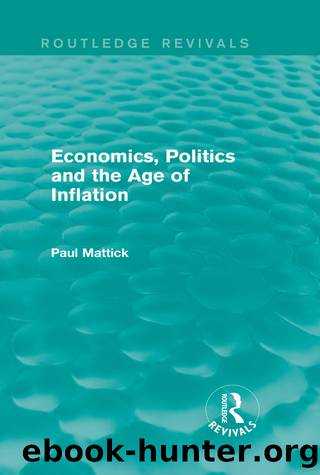Economics, Politics and the Age of Inflation by Mattick Paul;

Author:Mattick, Paul;
Language: eng
Format: epub
Publisher: Routledge
In such a situation capitalist society has only its own demise ahead of it. The state is forced to intervene in the market mechanism in ways that can only paralyze it; in a word, it is constrained to apply political measures divorcing the relations of production from its market relations in order to maintain at least the former. On the other hand, as the market mechanism disintegrates, it requires on its own account government interventions to prolong its own existence, i.e., individual capital entities and corporations need the authority of the state to ensure their profitability. Economic and political measures therefore coincide;capital becomes the government, and the government spells capital. State authority, which had always been dependent on and at the service of capital, is now fully identified with capital, and its first function is to maintain the exploitative relations that market relations can no longer guarantee.
Under the hegemorty of monopoly capital, the average rate of profit, which is mediated by competition, is no longer able to regulate the market mechanism. Pricing, which is done in a relatively arbitrary fashion, results in the transfer of profits from competing enterprises to the monopolies. Although this promotes capital concentration and centralization, by itself it effects no change in the total mass of profits, unless in the process the productivity of labor also increases commensurately with the needs of accumulation. If this does not occur, monopolization hinders the emergence of market relations advantageous to a progressive accumulation and gives rise to deepening contradictions on the money and commodity markets. Growing monopolization is the expression of both the rise of capital and its fall, just as accumulation heralds its beginning and its end.
Since monopolization is a product of competition, it cannot be arrested. Monopolistic pricing distributes social profits in accordance with the claims of monopolies. Thus monopolistic pricing is already the pacesetter of government distribution policy, and it is only a question of which is more appropriate: whether the state will choose the indirect way of monetary policy or the direct way of price and wage policy. However, centralized control over the entire economy, such as exists in the planned economies, cannot be achieved without the total abolition of private capital property relations. But that means a social revolution that would sweep away state monopoly capitalism. Hilferding's "general cartel" is therefore an illusion on both the national and international scale. State-capitalism destroys the economic basis for class rule for both competitive and monopoly capital, but it gives rise to a new class that rules by political means alone to assume the required control over production and distribution. Present monetary policy reflects the double-faced nature of the mixed economy, its progressive nationalization of production within existing property relations, and the resulting sharpening conflict between the real needs of society and the accumulation needs of capital. On the one hand, money is supposed to function as an instrument of deliberate and conscious economic management, but on the other it must perforce reflect existing relations of production and the resultant distribution of the social product.
Download
This site does not store any files on its server. We only index and link to content provided by other sites. Please contact the content providers to delete copyright contents if any and email us, we'll remove relevant links or contents immediately.
International Integration of the Brazilian Economy by Elias C. Grivoyannis(57326)
The Radium Girls by Kate Moore(10907)
Turbulence by E. J. Noyes(7040)
Nudge - Improving Decisions about Health, Wealth, and Happiness by Thaler Sunstein(6633)
The Black Swan by Nassim Nicholas Taleb(6192)
Pioneering Portfolio Management by David F. Swensen(5606)
Rich Dad Poor Dad by Robert T. Kiyosaki(5150)
Zero to One by Peter Thiel(4824)
Man-made Catastrophes and Risk Information Concealment by Dmitry Chernov & Didier Sornette(4738)
Secrecy World by Jake Bernstein(3783)
Millionaire: The Philanderer, Gambler, and Duelist Who Invented Modern Finance by Janet Gleeson(3569)
Skin in the Game by Nassim Nicholas Taleb(3462)
The Age of Surveillance Capitalism by Shoshana Zuboff(3423)
The Money Culture by Michael Lewis(3284)
Skin in the Game: Hidden Asymmetries in Daily Life by Nassim Nicholas Taleb(3264)
Bullshit Jobs by David Graeber(3180)
The Dhandho Investor by Mohnish Pabrai(3169)
The Wisdom of Finance by Mihir Desai(3079)
Blockchain Basics by Daniel Drescher(2891)
